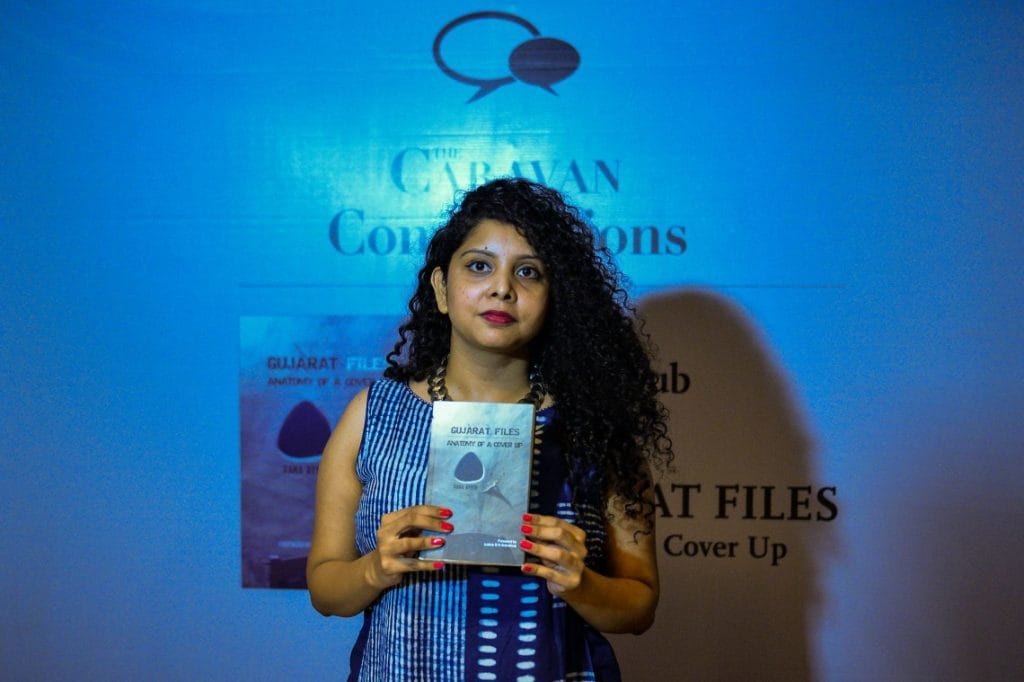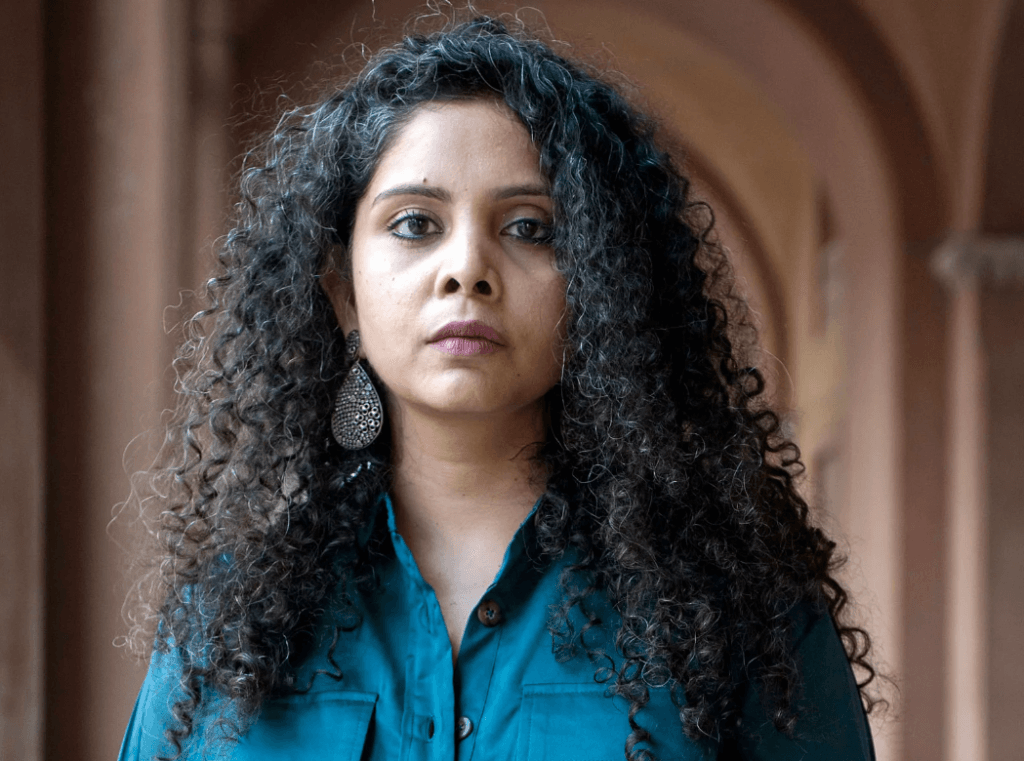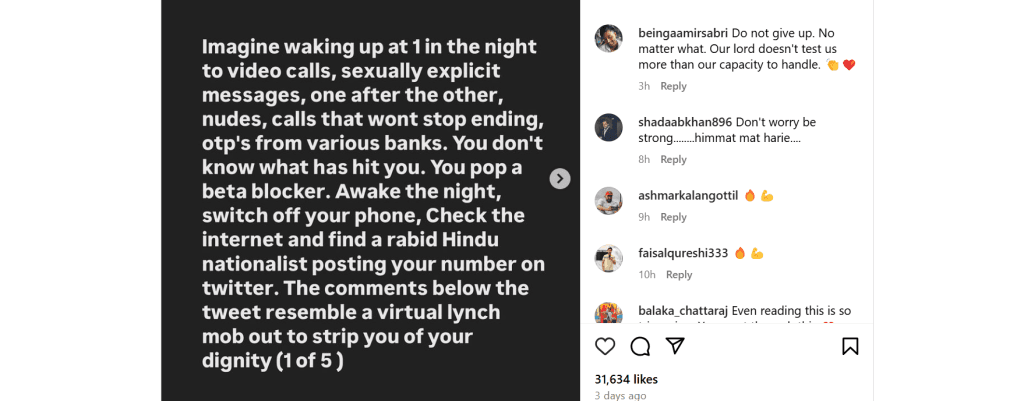Journalist Rana Ayyub, who writes opinion pieces for The Washington Post, was harassed, doxxed and closely scrutinised by officials after her number was leaked online. She was followed and continuously interrogated by intelligence officials in the course of her trip to Manipur for a reporting task earlier in October. Ayyub was inquired about whom she met and the issues she covered for reporting. The officials stated that they followed her purely for her “security,” reasons, acting on the orders from the “higher office.”
On November 8, Ayyub reported that an X user by the name of “Hindutva Knight” affiliated with the right wing leaked her phone number and urged his followers to harass her. As a consequence, throughout the night, she received about 200 phone calls, video calls, and sexually explicit messages via WhatsApp and OTP requests from online banking platforms. What followed was the filing of a complaint by Ayyub with cyber crime officials in Mumbai. The account, deactivated at present, was run by a man named Chandan Sharma, notorious for publicly harassing those who resist Hindutva ideology or tweet against the ruling party, particularly Muslim women.
A user on X (formerly Twitter) replied to the news stating, “Hope she returned the scammed money.” Taking to her Instagram account, Ayyub compared the act to a “virtual mob lynching out to strip you of your dignity,” how she has been labelled a “jihadist” by the ruling party’s ministers. She questions, “How do I leave this profession that is not just a 9-5 job for me but a passion that is the elixir of my life., Quitting was never, will never be a moral option and I will not till such time I retain my sanity.”
A ‘democratic’ India?
In an interview with Newsweek, the Prime Minister argued that the “claims of diminishing media freedom in the country are dubious.” However, it was in the very same country that Rana Ayyub was subjected to online harassment at the hands of the “guardians” of Hindutva. Referring to this condemnable act, CPJ Asia Program Coordinator, Beh Lih Yi argued, “The relentless targeting of Rana Ayyub, one of India’s most prominent journalists, is shameful., Indian authorities must swiftly investigate the doxxing of Ayyub and hold the perpetrators accountable. Using surveillance and intimidation to deter journalists from reporting effectively has no place in a country that prides itself on being the mother of democracy.”

Journalists have been threatened and tortured for reporting on communal issues, which is simply a part and parcel of their job. For instance, in 2022, four out of five journalists who happened to be Muslims were referred to as “jihadis” at the Hindu Mahapanchayat event in Delhi.
Female journalists have reportedly been victims of a new form of harassment, digital in nature, as evidenced by their pictures floating on the Bulli Bai app, where they are put “on-sale“. In the words of Prof. Shakuntala Banaji, “When the state resorts to shutting down the freedom of expression of journalists holding institutions to account, then we are deep in authoritarian rule.”
A fearless journalist and a fearful government
In her renowned book, “Gujarat Files: Anatomy of a Cover-Up” she drew attention to how she went undercover as an American Indian Hindu and exposed how Muslims in Gujarat were subjected to genocide and it is a reality that continues to prevail not only in the state but across the country now. In a conversation with Maktoob Media in 2023, Ayyub referred to herself as the “story and storyteller” of the country today.

In an interaction with The Nobel Prize, she asserted, “It has never been more important in the history of humankind for the world to acknowledge that we are facing a problem that has the potential to change the world order for the worse. Fake news takes lives, disinformation is fuelling wars, pogroms and aiding genocidal tendencies in some of the most robust democracies., Never has it been more urgent for the world to hear stories that have been destroyed by propaganda. Those attending Truth, Trust, and Hope this May need to be prepared to deal with some uncomfortable truths. They need to hear unpopular opinions if they indeed do care about human rights, civil liberties, and an idea we cherish, an idea we call democracy.”
The harassment inflicted upon her skyrocketed after she tweeted against Saudia Arabia’s involvement in fueling the Yemen war, following which she received over 25,000 rape threats and the circulation of a furnished tweet carrying the statement, “I hate India and I hate Indians,” alleging Ayyub for having made the statement. If that wasn’t enough, in 2018 she asserted that her face was cropped out and edited onto a pornographic video, shared through WhatsApp, a deplorable attempt to shatter the resolve of a journalist committed to presenting a version of truth that must be known, the essence of which is captured in her words, “There’s an unpopular truth that all of us must speak and I’m here to speak that truth.”
Guardian of unpopular truth
In 2022, her bank account was frozen for the second time as part of an investigation into her involvement in money laundering, accusing her of misusing the funds raised for COVID-19 victims. The International Centre for Journalists argued that these false accusations were hurled at her only to deter her brave and anti-establishment journalism. In this light, she stated, “The entire machinery of the state was unleashed against me.”

While addressing the gathering at the International Journalism Festival, Ayyub stated, “I am proud of the fact that the government is scared of me and my words because somewhere it is impacting them, my truth is impacting them. I’m glad.” She shed light on the mental agony experienced every time an attempt is made to trivialise whatever she does, for instance, being investigated over her $3 food bill. In the same year, Advocates of human rights serving in the United Nations “respectfully” urged the government in India to “end relentless misogynistic attacks” on her.
However, only a month later, she was barred from visiting Europe to express her take on the suppression of journalists and press freedom in a country that boasts of being the largest democracy in the world.
Media, ‘first pillar‘ of an authoritarian regime in India
Today, journalists can operate safely only by how the ruling party drives them. If they dare to deviate, they are deemed “anti-national” and every attempt is made to cripple and threaten them. Media is no longer the fourth pillar of democracy, it is the first pillar of an authoritarian, absolutist regime. Mainstream media houses are not anti-partisan or autonomous of the government, they are funded by members of the ruling party to further its majoritarian interests.
The only form of journalism that is considered desirable by the ruling party fuels their attempt to transform the country into a Hindu nation. Independent journalists often become a roadblock to this attempt by holding the government accountable and questioning its decisions and therefore, they become the victims of harassment, bullying, blackmail, and fraud accusations, all initiated by the upholders of Hindu nationalism envisioned by the ruling party. It is a pity that mainstream journalism has only become another name for propaganda and those who regard truth as paramount, who perceive advocating for truth as a moral imperative, and who muster the courage to amplify their voice against the government’s actions are silenced.
Rana Ayyub’s number getting leaked was not a singular event of harassment. It is the product of efforts to harass, torture and threaten “anti-national” elements. These efforts have been mounting up, escalating and explicitly aimed against her and the innumerable journalists who don’t fear authoritarianism and rather use their voice to expose it. The government’s actions in this case are a stark example of how journalists expressing dissent fall prey to systemic oppression through social media and at the hands of the ruling party in India today.
About the author(s)
Syeda Shua Zaidi is a student of B.A. (Hons) Sociology, at Miranda House. Passionate about poetry, filmmaking, heritage walks, social work and all things vintage, you would find her reading the works of Murakami, Khaled Hosseini and Agatha Christie while treating herself to a cup of tea. Firmly a believer of "disagreements are welcome, disrespect is not".





